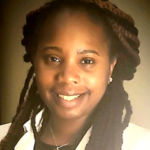GSA is pleased to announce the recipients of the DeLill Nasser Award for Professional Development in Genetics for Fall 2023! Given twice a year to graduate students and postdoctoral researchers, DeLill Nasser Awards support attendance at meetings and laboratory courses.
The award is named in honor of DeLill Nasser, a long-time GSA supporter and National Science Foundation Program Director in Eukaryotic Genetics. Nasser was regarded by some as the “patron saint of real genetics,” shaping the field through more than two decades of leadership. She was especially supportive of young scientists, people who were beginning their careers, and those trying to open new areas of genetic inquiry. For more about Nasser, please see the tribute from Scott Hawley, published in the August 2001 issue of GENETICS.

Mariana Harris
University of California, Los Angeles
My research focuses on quantifying the tempo and mode of adaptation in natural populations, highlighting the distinction in selection signatures (selective sweeps) between the X chromosome and autosomes, driven by the unique effect of selection on the hemizygous X chromosome in males.

Jennifer Alexander
University of Pennsylvania
My research seeks to understand the link between the aging process and cancer progression in high risk populations.

Renee Geck
University of Washington
I use yeast as a tool to understand how differences in genetic sequence can affect how people respond to pharmaceutical drugs.

Landen Gozashti
Harvard University
I use a combination of computational and statistical methods to interrogate the origins of genome architecture and the mechanisms driving genome structure evolution.

Bogdan Sieriebriennikov
New York University
I study how the nervous system evolves by comparing different insects.

Sarah Colon Plaza
University of Colorado
I study the non-apoptotic role of apoptotic caspases after Ionizing Radiation (IR) exposure.

Travis Tu’ifua
University of Utah
I study genetic interactions in a fruit fly model of a rare human disease called NGLY1 deficiency to understand the genes and pathways that modify disease symptoms.

Rachel Meade
Duke University
I study the interactions between Mycobacterium tuberculosis, the bacterium that causes tuberculosis, and genetically diverse mice to understand the genetic factors that control susceptibility to tuberculosis in a diverse human population.

Malek Elsayyid
University of Delaware
I use a C. elegans model and genetic techniques to study extracellular vesicles as a form of intercellular signaling in both homeostasis and disease.

Julio Molina Pineda
University of Arkansas
I leverage natural variation in yeast to understand why certain individuals are more susceptible to stress and disease.



